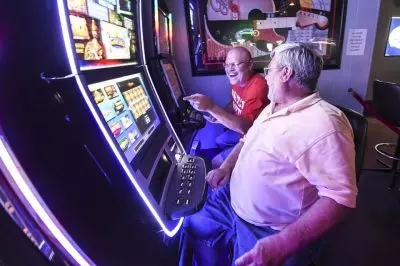 Discussions regarding video gambling fees in the city of Elgin are still on the table. Yesterday, local officials brought the matter of implementing video gambling licensing fees to light once again.
Discussions regarding video gambling fees in the city of Elgin are still on the table. Yesterday, local officials brought the matter of implementing video gambling licensing fees to light once again.
For some time now, Elgin’s liquor control commission has been discussing the possibility of implementing yearly licensing fees for video gambling, which has been legal in the city since 2013. Two new license fees – one for restaurants and bars which offer video gambling terminals (VGTs) and one for the machines’ distributors – were proposed by the Corporation Counsel Bill Cogley.
For the time being, according to the Illinois Gaming Board, there are eight licensed distributors in the state. They could face an annual licensing fee of $1,200 for each video gambling machine under Cogley’s proposal. As he explained, the same fee is charged by the city of Aurora on their VGTs.
On the other hand, bars and restaurants could be required to pay an annual fee of $25 for each video gambling machine they host. According to research used by Cogley while preparing his proposal, the same amount is charged by South Elgin. This has been the lowest fee among the 12 communities which participated in the survey, including Aurora, West Dundee, East Dundee and Carpentersville.
For now, no official decision has been made by the local liquor commission, as the regulator will continue the discussions in March, too, after Mr. Cogley provides more research data.
Elgin Officials Could Limit the Maximum Number of Video Gambling Licenses
 The proposed changes do not stop here. Apart from implementing an annual video gambling license fee, the city of Elgin could also impose a limit to the maximum number of VGTs to the current 143, with the licenses set to be non-transferable. According to Mayor David Kaptain, such a solution might put bar and restaurant owners at ease.
The proposed changes do not stop here. Apart from implementing an annual video gambling license fee, the city of Elgin could also impose a limit to the maximum number of VGTs to the current 143, with the licenses set to be non-transferable. According to Mayor David Kaptain, such a solution might put bar and restaurant owners at ease.
Corporation Counsel Bill Cogley has explained that most of the 32 establishments which currently hold video gambling licenses were in operation before 2013, when VGTs were officially permitted in the city of Elgin. Only a few businesses have started operation after the machines were brought to the city.
Carol Rauschenberger, who is a city council member, explained that she would like to see video gambling only as a complementary offering to their major services so that video gambling machines are not turned into their major source of income. According to Ms. Rauschenberger, if a business remains in operation only because of the machines, it is VGTs which could be described as the main source of income for the establishment. This is why the councilwoman explained that the commission should take the bigger picture and the overall effects of video gambling on the local community in mind.
Of course, the idea that video gambling should only be offered as a supplementary service to the regular services offered by local businesses faced criticism, too. According to Councilman Terry Gavin, such use might cause difficulties to some of the existing establishments, especially when it comes to smaller establishments.